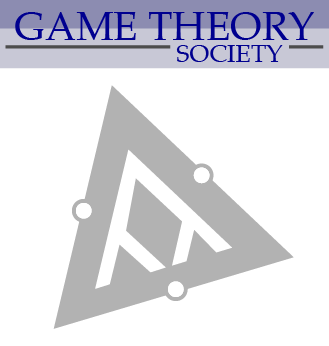Keynote Speakers
David Schmeidler, Tel Aviv University and Ohio State University (President GTS)
Larry Samuelson, Yale University (President-Elect GTS)
Robert J. Aumann, Hebrew University of Jerusalem (Nobel Laureate 2005)
Eric Maskin, Harvard University, Cambridge (Nobel Laureate 2007)
Roger Myerson, University of Chicago (Nobel Laureate 2007)
Morgenstern Lecture: Thomas Palfrey, Flintridge Professor of Economics and Political Science at the California Institute of Technology, has been selected to present the Morgenstern Lecture at the 2016 World Congress of the Game Theory Society. Thomas Palfrey graduated from the University of Michigan in 1975 and received his PhD in 1981 from Caltech. He is best known for his contributions to Game Theory (both theoretical and experimental) and pioneered its use in the study of Politics.
von Neumann Lecture: Sylvain Sorin, Professor at the University of Paris VI (Pierre and Marie Curie), has been selected to present the von Neumann Lecture at the 2016 World Congress of the Game Theory Society. Sylvain Sorin graduated in 1976 from the Ecole Normale Superieure de Saint Cloud and received his Doctorat d'Etat in 1981 from Paris VI. Since then he has made fundamental contributions to a variety of areas in the Theory of Games: repeated games, stochastic games, merging and reputation, and approachability. Beyond the force of his ideas, he has played a significant role in the cultivation and subsequent flourishing of what might arguably be called a "French School" of Game Theory.
Shapley Lecture: Bruno Ziliotto graduated in Mathematics under the supervision of Jerome Renault at the Toulouse School of Economics in 2015, and is currently holding a post-doctoral fellowship from the Fondation des Sciences Mathematiques de Paris. Ziliotto contributed deeply and widely to the general theory of repeated games. He has refuted two long-standing conjectures, which were highlighted by Mertens in a published talk at the International Congress of Mathematicians (Berkeley, 1986), by proving that the value of the n-stage stochastic game with finitely many states and actions, unobservable states, and symmetric information, need not converge. His work and results are already reshaping the research agenda in mathematical game theory.
Kalai Prize Lecture: Tim Roughgarden is an Associate Professor of Computer Science and (by courtesy) Management Science and Engineering at Stanford University. His paper "Intrinsic Robustness of the Price of Anarchy" (Journal of the ACM (JACM) 62:5, Article No. 32, 2015. Conference version: STOC '09, Proc. 41st Annual ACM Symposium on Theory of Computing, pages 513-522, 2009) has been selected as the winner of the Game Theory and Computer Science (Kalai) Prize in 2016. Tim Roughgarden received a BS in Applied Mathematics from Stanford in 1997, and a PhD in Computer Science from Cornell in 2002.
An important direction of research in the computer science and game theory interface is aiming to quantify the inefficiency of equilibria in games, dubbed by Koutsoupias and Papadimitriou as the price of anarchy. This line of research aims to distinguish between games where equilibria can be arbitrarily far from a centrally designed optimum solution, and those where the loss of efficiency is more limited. A bound like this can help the analyst evaluate the need to change mechanisms to improve efficiency. The winning paper unifies this line of work, and, perhaps most importantly, offers an extension theorem. Classically, the price of anarchy aimed at bounding the efficiency loss at Nash equilibria. The fact that many games have multiple Nash equilibria, and the computational difficulty of finding Nash equilibria, cast shadow on the implicit assumption that players will be able to coordinate on a Nash equilibrium of the game. The paper extends the same bound to all (coarse) correlated equilibria. This extension is especially important as such equilibria arise whenever all players use a form of no-regret learning to choose their strategies, such as Hart and Mas-Colell's regret matching.
Roughgarden's paper has been highly influential since its publication. Its concept of "smoothness proof" quickly entered the lexicon of researchers working on the price of anarchy, and it has stimulated numerous refinements, extensions, and applications.
Semi Plenary Lectures
Colin Camerer, California Institute of Technology
Pierre Cardaliaguet, Université Paris-Dauphine
Hülya Eraslan, Rice University
Michal Feldman, Tel Aviv University
Guillaume Fréchette, New York University
Paul Klemperer, Oxford University
David Levine, European University Institute
Mihai Manea, Massachusetts Institute of Technology
Hervé Moulin, University of Glasgow
Christos Papadimitriou, University of California, Berkeley
Alessandro Pavan, Northwestern University
Arthur Robson, Simon Fraser University
Jeff Shamma, King Abdullah University of Science and Technology
Chris Shannon, University of Calfornia, Berkeley
Avi Shmida, Hebrew University of Jerusalem
Vasiliki Skreta, University College London
Eilon Solan, Tel Aviv University
Balázs Szentes, London School of Economics
Utku Ünver, Boston College
Rakesh Vohra, University of Pennsylvania
Leeat Yariv, California Institute of Technology
Wojciech Załuski, Jagiellonian University
Shmuel Zamir, Hebrew University of Jerusalem



